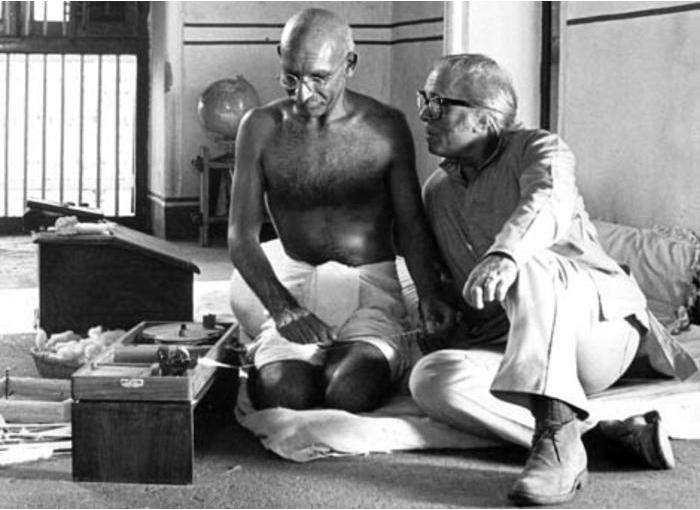Watching Attenborough’s Gandhi with my kid – Part 2
Continued from Part 1….
So what makes Gandhi such a great film? Consider for example a scene at the end of the film where Gandhi, incarcerated in a former palace converted into a makeshift prison, is sitting in the garden and spinning cotton. Margaret Bourke White the celebrated Life magazine photographer, played by the stunningly beautiful Candice Bergen, watches with growing exasperation. She tries her hand at spinning and failing to produce a centimeter of thread, exclaims in frustration, “I fail to see this (spinning cotton) as a solution to the world’s problems”. She is referring of course to the scourge of WW2, which the world is facing, and the matter of India’s independence appears trivial in comparison. She asks Gandhi a pointed question about Hitler and if nonviolence will work on him. Gandhi replies, “Not without defeats and sacrifices, but are there no sacrifices and defeats in this war?” His reply is in two parts- his shrug which implies his admission that he has not fully though through this, and his words which convey his absolute belief in a philosophy that he has spent a lifetime testing and fine tuning (he called his autobiography simply “My Experiments with Truth”). Note also his deft handling of media in those early days to his advantage, told as a side story about his enduring friendship with a NY Times reporter. Ben Kinsley speaks of one scene with Martin Sheen filmed in Gujarat against the backdrop of a setting sun on the Arabian Sea where Gandhi and Charlie discuss the Dandi March which he is about to embark upon, as a moment which he cherishes and which became a sublime piece of cinema.
There is an amusing scene involving Sardar Patel and Gandhi upon his arrival back to India from South Africa. Patel patronises Gandhi by telling him that he is no longer a bumbling junior lawyer in Bombay High Court and may address him by first name. The power of this film lies not in the performances, towering as they are, especially Ben Kinsley as Gandhi who digs very deep indeed, but in the brilliant and inspired screenplay.
The making of Gandhi has of course passed into folklore and Attenborough devoted his whole life to mounting this magnificent production, nearly bankrupting himself in the process and selling a stake in the iconic play “Mousetrap” to finance his magnum opus. The film enjoyed the wholehearted support of Nehru, during whose time it was conceptualized, and Indira Gandhi who facilitated the actual filming. I cannot imagine a film like this being made in todays fractured political environment without being subjected to umpteen narrow minded hurdles. The story of Gandhi is the story of India’s freedom struggle itself, of the choices that our ancestors made as a people, the birth and maturing of a philosophy, which continues to inspire world leaders even today. Above all Gandhi is the story of an individual who never shied away from his convictions and embraced the mistakes he made along the way. The film offers a well-rounded look at this enormous life. Gandhi never won the Nobel peace prize but the film won Oscar beating Spielberg’s E.T. in the process, a film Attenborough concedes to be better than his, in terms of it’s pure cinematic power.
A film even as magnificent as Gandhi can never be the only introduction to the Father of the Nation but in the absence of anything better it’s all we have to show our children. It’s the perfect combination of a compelling story told by the most compelling storytelling medium at the disposal of mankind – cinema. And we Indians owe a big debt to its maker Richard Attenborough.
I met Ben Kingsley once at a film festival in Holland where he was being honoured with a Lifetime achievement award. I asked him which part of Gandhi’s life would he like to see made into a another film, since his life was so rich. He replied, ” Any part, and a few have indeed been done”. This was a very wise response to the question and he turned around and complimented me on asking a very thought provoking question. I cherish that moment!
